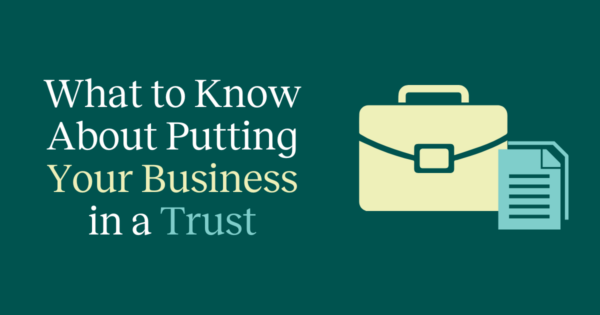So you’ve created, or updated, your estate planning documents. Congratulations! You’re at the final stretch but there’s one more important step you may need to take: Your documents need to be signed and notarized.
Getting your documents notarized serves a few purposes but the most important one is that without getting notarized, they may not be considered legally valid. That could open your estate up to potential probate proceedings or other court challenges.
We recommend following this process:
- Print your documents, or request them to be shipped to you.
- Take them to be signed in front of a notary (additional witnesses may be needed).
- Scan your notarized documents and upload them into your wealth.com Vault for security and accessibility.
Below we’ll detail more about the process, our recommendations and answers to common questions.
What does it mean to get estate planning documents notarized?
Getting a document notarized is when a notary public certifies the authenticity of signatures on a document. Typically, the process involves:
- Identity verification. The notary verifies that the person signing is who they claim to be. They typically ask for identification in the form of a driver’s license or passport.
- Witnessing the signature. A notary also needs to witness first-hand the person signing the documents willingly and not under coercion. Some states may require additional witnesses.
- Notarial seal and signature. After the notary confirms the above, they include their signature and their official or stamp confirming that the document is now legally valid and credible.
Why is a notary needed?
The primary reason for getting documents notarized is for your protection. First, to ensure that documents aren’t fraudulently signed in your name. For example, somebody signing a will in your name that you did not actually sign—like something out of a movie plot.
Second, to ensure that the documents are recognized by the legal system if, and when, they need to be executed. The last thing you want to happen with your estate plan is for there to be unnecessary legal action because the validity of the documents you signed is questioned. By getting documents notarized, when they need to be executed there is confirmation that you have willingly signed them and they can be legally executed because you followed your state’s regulations for getting them notarized.
How can I get my documents notarized?
Requirements for how to get documents notarized vary by state. Each state has its own laws and regulations governing how notarization works. Differences between states may include identification requirements you can use or if you need additional witnesses as well as training requirements for notaries themselves.
If you need to notarize your documents, you can actually order a mobile notary directly within Wealth.com. We offer a nationwide network across all 50 states of trust-certified notaries who can meet you at a preferred date, time, and location. Your advisor doesn’t need to coordinate this appointment, since our mobile notary preferred provider, Sign Here Ink, manages all orders and scheduling. Our mobile notaries also bring printed copies of your documents to the appointment, so there’s no need to print them yourselves. Once the appointment concludes, the notary will leave the original documents with you to keep and scan a digital version for your advisor same-day to download. It’s that simple! If you’re a Wealth.com user, you can learn more about how to request a mobile notary your Help Center or by asking our AI assistant.
You can also find a notary at a local UPS or FedEx location. Banks also often have notaries on staff, although you may need to be a customer to use them. You can also search online for local notaries near your home. The benefit of going to a UPS or FedEx location is that you can print your documents there (if you don’t have a printer at home), get them notarized on site and then scan the signed documents and have them emailed to you so you can upload them to your secure Vault.
When you print your wealth.com documents, details for getting them notarized in your state will be included.
Are online notary services also available?
Online notary services are legal to use in some states but you should use caution if you choose to use one. That’s because while they can legally operate in some states, there still may be legal requirements that could conflict or create confusion with the use of an online notary.
For example, New Jersey allows remote ink-signed notarization but doesn’t recognize remote online notarization—the difference being the need for a wet signature. However, that ability to get it remotely can easily cause confusion.
Furthermore, some online notary services may not accurately follow state-specific instructions if they operate in multiple states, opening you up to potential issues in the future.
Legislation in a number of states is likely to continue to be updated, with the hope that remote online notarization becomes a simpler process. We are actively monitoring legislation across the country and will notify you—via instructions when it’s time to sign your documents—if remote online notarization is allowed in your state.
Until then, we do recommend an in-person notary as the best way to ensure that you minimize any potential legal issues if, and when, your documents are executed in the future.
Can I get my documents notarized in another state?
It’s recommended that you follow your state regulations and also discuss with your notary. Technically, a notary can legally notarize documents from any state as long as the notarial act occurs in the state in which they were commissioned because notaries are typically only verifying the signer’s identity and not the document itself.
However, best practice would be to confirm with the notary that they don’t believe this would be an issue. We also recommend extreme caution in this instance that the document is being notarized according to the instructions of the state they were produced in.
What if someone named in my estate plan is also a notary?
It’s not usually recommended that any interested party notarize or witness any estate planning documents.
Certain states will strike the nomination as executor or gift to a beneficiary if a witness is the individual named as either. Even without a specific statutory prohibition in a given state, it opens the door for all kinds of litigation arguments around undue influence and capacity in execution



